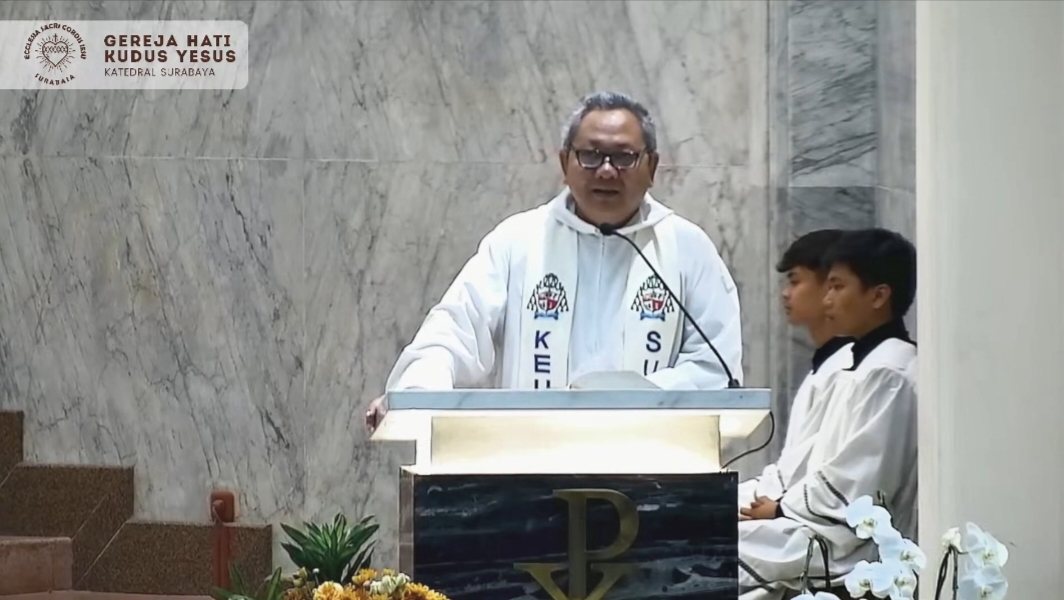New Bishop of Surabaya: ‘Church an integral part of society’
After more than a year of sede vacante, Pope Francis appointed Fr. Agustinus Tri Budi Utomo to lead the diocese in East Java. The local community celebrated the announcement with a solemn mass. Fr. Didik, as he is nicknamed by the faithful, returns to his Church of origin after having been a missionary in a more remote area of the country
Jakarta (AsiaNews) - After more than a year and a month of sede vacante, Pope Francis has appointed Fr. Agustinus Tri Budi Utomo as the new bishop of the diocese of Surabaya, in the province of East Java. The Holy See chose Fr Didik, as he is affectionately nicknamed by the faithful, making the decision official on 29 October.
To celebrate, the local community celebrated a solemn Mass presided over by diocesan administrator Fr Romo Yosef Eko Budi Susilo, attended by dozens of local priests and most of the Catholics in the area.
Despite his pastoral experience in the diocese of Surabaya, Fr Didik spent more than four years carrying out a missionary assignment in the parishes of Marau and Tembelina, in the diocese of Ketapang, West Borneo province. These are two remote areas with a wide variety of problems and challenges, not least that of an adventurous journey to the interior to reach them.
The new bishop will take the place of his predecessor Bishop Vincentius Sutikno Wisaksono, who passed away on 10 August 2023 after months of serious illness. Following the formalisation of the appointment during the celebration, Fr. Didik stood up and addressed the onlookers, asking them for support and prayers so that he ‘may manage well our community, which numbers 160,000 people and 46 parishes’ throughout the diocese.
The territory of Surabaya stretches between cities in East Java Province and some cities in the easternmost regions of Central Java Province. He pledged to continue the work and pastoral platforms already initiated by the diocese, while strengthening the community's capacity for presence and activities throughout the territory.
‘The Catholic Church,’ he warned, “must be an integral part of society” even in a reality like Indonesia, the most populous Muslim nation in the world. ‘Becoming a bishop,’ he continues, ‘means having the responsibility to lead our people to love society, so that the presence of the Church can create its positive effects in the territory. As bishop, he concludes, he will lead the diocese of Surabaya to ‘adopt methods to develop people's economic potential, including through start-up programmes and credit unions’. Episcopal ordination is scheduled for the new year.
Bishop Agustinus Tri Budi Utomo was born on 12 March 1968 in Ngawi, a town in the province of East Java. After entering the St. Vincentius Minor Seminary in Paulo in Blitar, the new bishop continued his formation at the St. John XXIII Interdiocesan Major Seminary in Malang, attending the Widya Sasana Philosophical and Theological Institute in Malang, where he obtained a Baccalaureate and Master's degree in Theology.
On 27 August 1996, he was ordained a priest, and during these 28 years of missionary work, he held various positions including: parochial vicar (1996-2000) and parish priest (2000-2001) of St Mary Announced in Sidoario; lecturer at Universitas Airlangga (1996-2001); director of the Lembaga Karya Dharma Social-Health Foundation (2001); president of the Yohanes Gabriel Educational Foundation (2006, 2007-2012); episcopal vicar of Cepu and parochial vicar of St. Willibrordus in Cepu (2008-2011); since 2011 he has been vicar general of the Diocese of Surabaya and episcopal vicar for pastoral care.
Surabaya is the capital of East Java Province, the third largest city in the Indonesian archipelago in terms of population and economy. The Apostolic Prefecture was established on 15 February 1928, after separating from the then Apostolic Vicariate of Batavia (attached to the Metropolitan Archdiocese of Jakarta). On 16 October 1941 it was promoted as the Apostolic Vicariate of Surabaya and on 3 January 1961 as the Diocese of Surabaya. Since its establishment, the diocese has been under the leadership of Congregatio Missionis (Cm) with its last bishop, Bishop Jan Antonius Klooster CM (1961-1982) and later under the leadership of local diocesan priests starting with Bishop Aloysius Josef G. Dibjokarjono (1982-1994).
07/02/2019 17:28
06/07/2020 16:30







.png)










